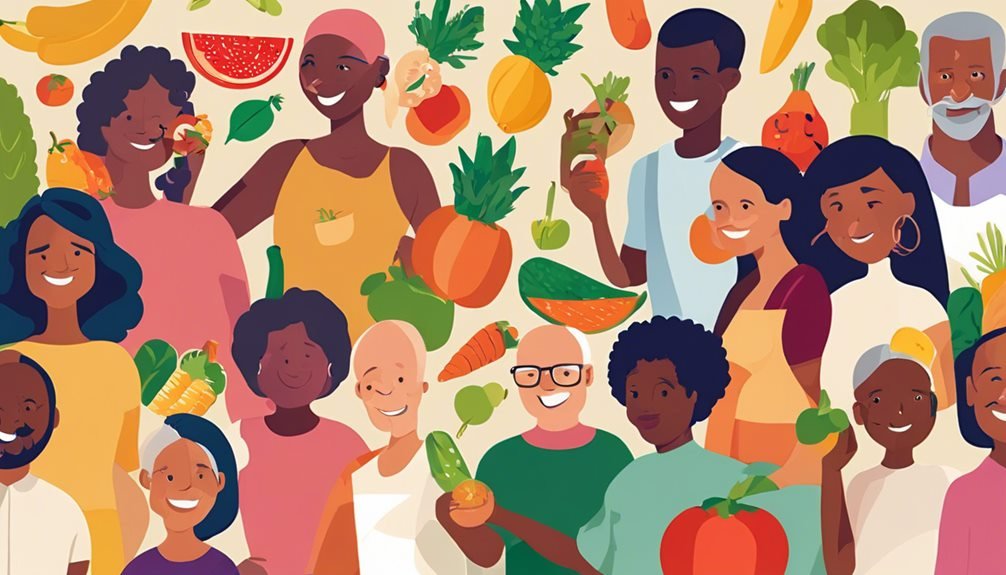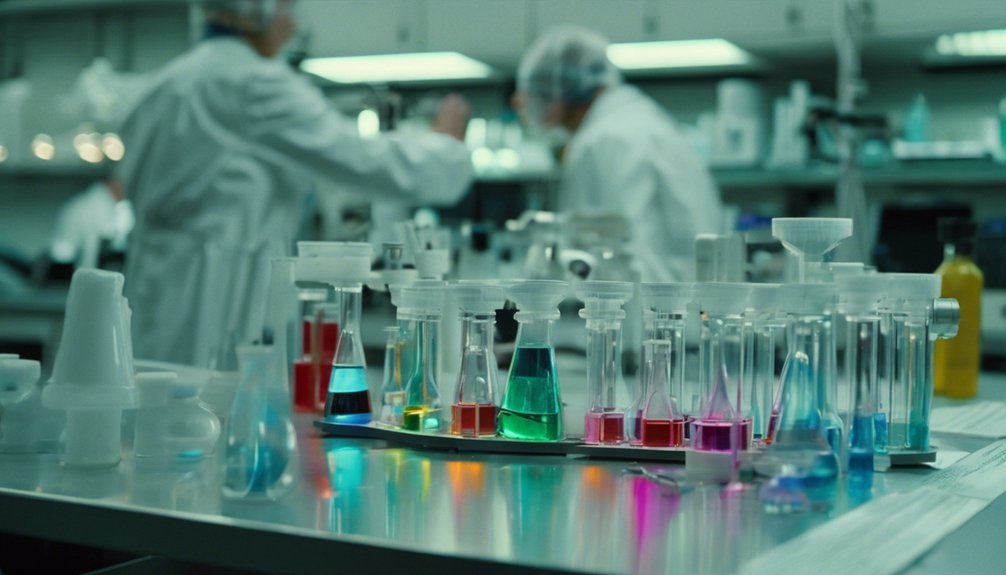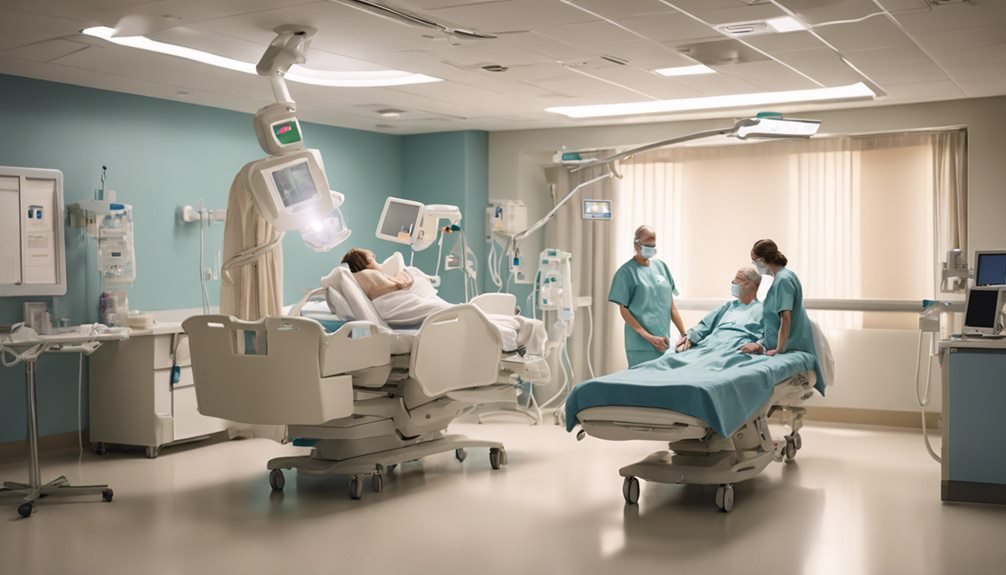You might have heard various dietary myths surrounding cancer management, but how many of them hold true? From sugar's alleged role in fueling cancer growth to the hype around specific superfoods, separating fact from fiction is crucial. While some nutritional strategies can complement cancer treatment, others may do more harm than good. So, before making any dietary changes, it's essential to sift through the myths and misconceptions to ensure you're on the right path towards supporting your overall health and well-being.
Key Takeaways
- Sugar doesn't directly cause cancer growth.
- Alkaline diets don't prevent cancer conclusively.
- No single superfood cures cancer; focus on balanced nutrition.
- Vegan diets can provide essential nutrients during cancer treatment.
- Supplements complement, not replace, conventional cancer treatments.
Sugar Feeds Cancer
Many people believe that consuming sugar directly fuels the growth of cancer cells. While it's true that cancer cells consume more glucose (sugar) than normal cells, it's important to understand the nuances of this relationship. Sugar intake alone doesn't directly cause cancer, but excessive consumption may contribute to weight gain and obesity, which are risk factors for various cancers.
When it comes to fruit consumption, some may worry about the sugar content in fruits. However, the sugar in fruits, called fructose, is accompanied by fiber, vitamins, and antioxidants that are beneficial for overall health. The fiber in fruits slows down sugar absorption, preventing rapid spikes in blood sugar levels.
Carbohydrate intake, including sugars, should be balanced within a healthy diet. Opt for complex carbohydrates like whole grains, legumes, and vegetables, which provide sustained energy without the negative effects of refined sugars. Moderation and a varied diet are key to maintaining a healthy balance of nutrients that support overall well-being.
Alkaline Diet Prevents Cancer
The idea that an alkaline diet can prevent cancer has gained popularity in recent years. However, it's essential to address this as an alkaline myth rather than a proven method for cancer prevention. While proponents of the alkaline diet suggest that eating foods which promote an alkaline environment in the body can prevent cancer growth, scientific evidence doesn't fully support this claim.
Maintaining a balanced pH level in the body is crucial for overall health, but solely relying on an alkaline diet to prevent cancer isn't backed by robust scientific evidence. Cancer is a complex disease with various factors influencing its development, and diet is just one piece of the puzzle.
Instead of focusing solely on an alkaline diet, it's recommended to follow a balanced and nutritious eating plan that includes a variety of fruits, vegetables, whole grains, and lean proteins. This approach, combined with regular exercise and other healthy lifestyle habits, can contribute to overall well-being and potentially reduce the risk of cancer. Remember, moderation and diversity in your diet are key to supporting your health.
Superfoods Cure Cancer
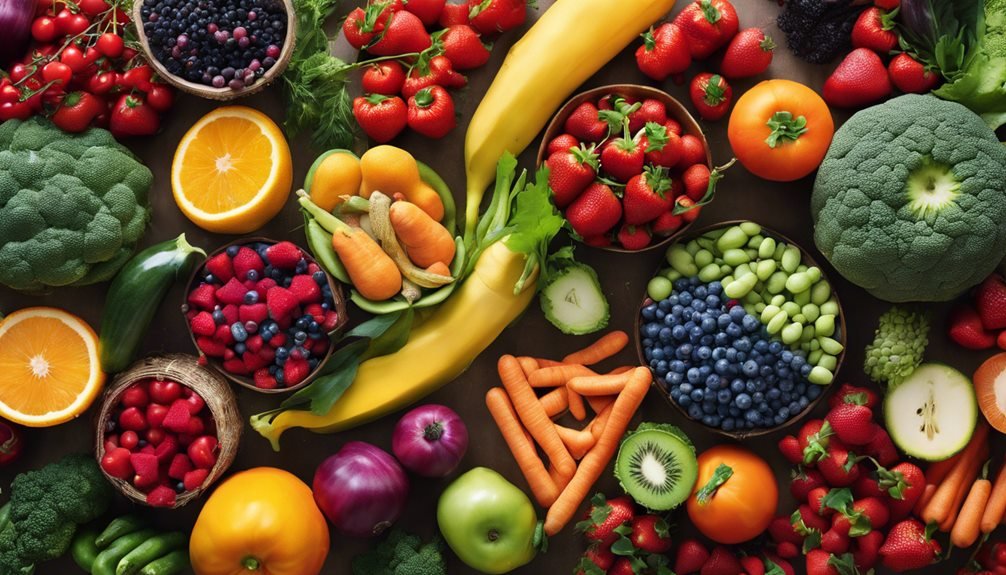
Despite the widespread belief in the power of certain foods to cure cancer, it's crucial to approach the concept of "Superfoods Cure Cancer" with a critical eye. While some foods are rich in antioxidants and nutrients that support overall health, there's no single "superfood" that can cure cancer on its own. Instead, focusing on a diet that promotes nutritional balance and an individualized approach is key in cancer management.
Nutritional balance is essential for supporting the body's immune system and overall health during cancer treatment. A diet rich in fruits, vegetables, whole grains, lean proteins, and healthy fats can provide the necessary nutrients to help the body fight cancer and cope with treatment side effects. However, it's important to remember that no single food or superfood can cure cancer.
An individualized approach to nutrition takes into account a person's specific dietary needs, preferences, and health status. Consulting with a registered dietitian or healthcare provider can help develop a personalized nutrition plan that supports overall health and well-being during cancer treatment. Remember, while superfoods can be beneficial, a holistic and balanced diet is the foundation for supporting your health in the face of cancer.
Vegan Diet Only Solution
When considering cancer management, the idea of a "Vegan Diet Only Solution" has gained attention as a potential way to support overall health and well-being during treatment. A vegan diet primarily consists of plant-based alternatives such as fruits, vegetables, whole grains, nuts, and seeds. While a vegan diet can provide many health benefits due to its focus on nutrient-rich foods, it's essential to ensure balanced nutrition to meet all your body's needs during cancer treatment.
Opting for a vegan diet can offer various advantages, including increased intake of antioxidants, fiber, and phytonutrients, which are beneficial for overall health. However, it's crucial to consult with a healthcare provider or a dietitian to ensure that you're getting all the essential nutrients your body requires. They can help you create a well-rounded meal plan that includes plant-based proteins, healthy fats, vitamins, and minerals necessary for your body's optimal functioning.
Antioxidants Interfere With Treatment
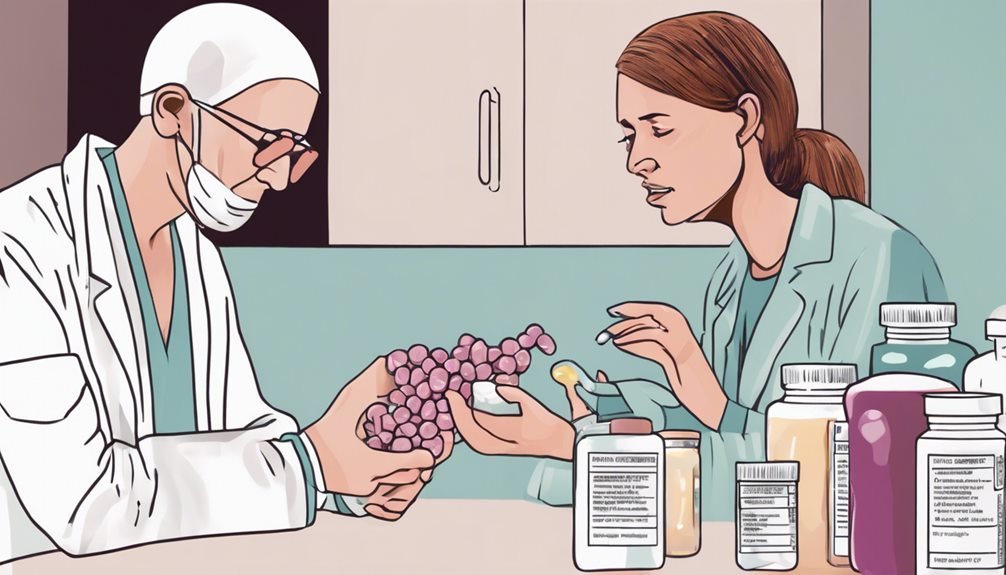
Frequently, there's a misconception that antioxidants can interfere with cancer treatment. However, clinical evidence suggests otherwise. Antioxidants, found in fruits, vegetables, and supplements, haven't been shown to decrease the effectiveness of cancer treatments. In fact, antioxidants may even enhance treatment outcomes by reducing treatment-related side effects and improving overall well-being during therapy.
Numerous studies have explored the impact of antioxidants on treatment effectiveness, and the results consistently indicate that these compounds don't hinder cancer therapy. Instead, antioxidants play a crucial role in supporting the body's natural defense mechanisms and promoting overall health.
It is essential to consult with healthcare professionals when considering incorporating antioxidants into your diet during cancer treatment. They'll provide personalized guidance based on your specific treatment plan and medical history. By understanding the clinical evidence and working closely with your healthcare team, you can make informed decisions that support your well-being and treatment outcomes.
Ketogenic Diet Starves Cancer
While antioxidants have been debunked as hindrances to cancer treatment, the ketogenic diet has emerged as a topic of interest in the realm of cancer management. The ketogenic diet is a high-fat, low-carbohydrate, and moderate-protein diet that aims to shift the body's metabolism from using glucose as its primary fuel source to using ketone bodies. This shift starves cancer cells that rely heavily on glucose for energy, potentially slowing down their growth. However, it is crucial to maintain protein balance and prevent nutrient deficiencies when following a ketogenic diet to ensure overall health and well-being.
Consider the following table highlighting key points to keep in mind when implementing a ketogenic diet for cancer management:
| Key Considerations | Explanation |
|---|---|
| Protein Balance | Adequate protein intake is essential for maintaining muscle mass and supporting immune function. |
| Nutrient Deficiencies | Monitoring vitamin and mineral levels to prevent deficiencies is crucial for overall health while on a ketogenic diet. |
Dairy Causes Cancer
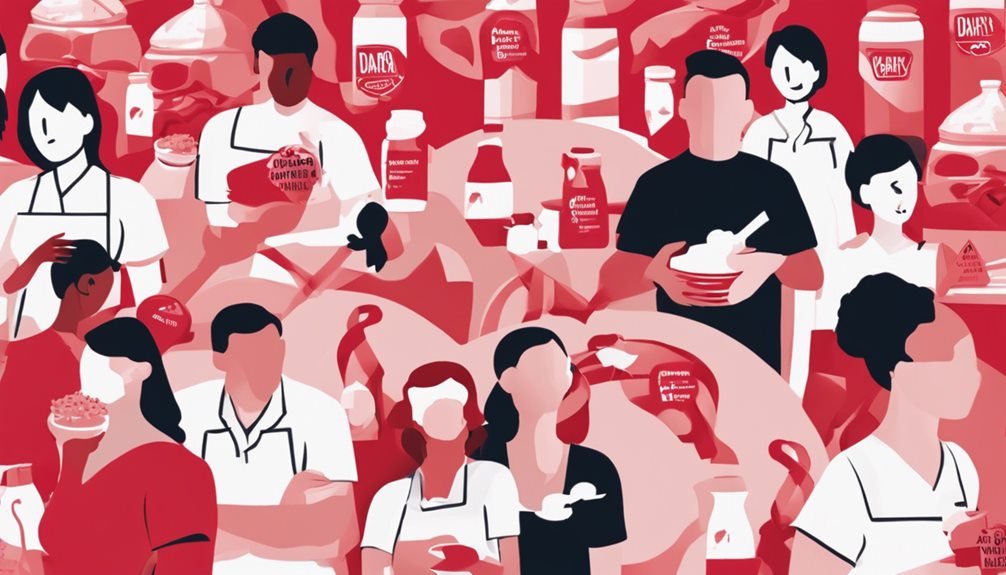
Is there a link between dairy consumption and cancer development? While the topic is debated, it's essential to examine potential factors to make informed choices. When considering the relationship between dairy and cancer risk, factors like hormones in dairy and dairy allergies may play a role. Here are some key points to consider:
- Hormones in dairy: Dairy products can contain naturally occurring hormones, like estrogen, and synthetic hormones given to cows for milk production. These hormones could potentially influence cancer development in the body.
- Dairy allergies: Some individuals may have allergies or intolerances to dairy products. Allergic reactions can trigger inflammation in the body, which in turn may contribute to the development or progression of certain types of cancer.
- Moderation and individual factors: While dairy consumption is a personal choice, moderation and awareness of how your body responds to dairy products are crucial. Consulting with a healthcare provider can help tailor dietary choices to individual needs and health goals.
Fasting Eliminates Cancer
Moving from the discussion on dairy and cancer risk, another topic that has gained attention is the idea that fasting eliminates cancer. While there is ongoing nutrition research exploring the potential benefits of fasting in cancer management, it is essential to approach this information with caution and consider it as part of a comprehensive treatment plan.
| Pros of Fasting | Cons of Fasting |
|---|---|
| May enhance the effectiveness of certain cancer therapies | Fasting may not be suitable for all cancer patients |
| Can potentially reduce inflammation and improve metabolic health | Prolonged fasting without medical supervision can lead to nutritional deficiencies |
| May support healthy cell function and reduce oxidative stress | Fasting may cause fatigue and weakness in some individuals |
| Some evidence suggests fasting could slow tumor growth | More research is needed to determine the long-term effects of fasting on cancer |
While fasting benefits are intriguing, it is crucial for individuals undergoing cancer treatment to consult healthcare professionals before making significant dietary changes.
Supplements Replace Medical Treatment

When considering cancer management, it's crucial to understand that supplements aren't meant to replace medical treatment. While supplements can play a role in supportive care, they shouldn't be viewed as a standalone solution. Here are three key points to keep in mind:
- Supplements as Supportive Care: Supplements can be beneficial in providing additional nutrients and supporting overall health during cancer treatment. They should complement medical treatments rather than replace them.
- Holistic Approach: Cancer management requires a holistic approach that integrates various treatment modalities. It's essential to work closely with healthcare providers to ensure that supplements are used in conjunction with conventional medical treatments.
- Consultation: Before incorporating any supplements into your cancer management plan, it's vital to consult with your healthcare team. They can provide guidance on the safety, effectiveness, and potential interactions of supplements with your ongoing medical treatment.
Raw Food Diet Beats Cancer
Utilizing a raw food diet in cancer management has gained attention for its potential health benefits and disease-fighting properties. When considering a raw food diet as part of cancer management, it is crucial to follow personalized nutrition guidelines to ensure you are meeting your specific dietary needs. This approach emphasizes the consumption of uncooked, unprocessed plant-based foods, which are rich in vitamins, minerals, and antioxidants that can support overall health and potentially aid in cancer prevention.
| Pros | Cons |
|---|---|
| High in Nutrients | Risk of Nutrient Deficiencies |
| Antioxidant Rich | Digestive Challenges |
| Supports Overall Health | Difficulty Maintaining |
| Potential Cancer Prevention | Social Limitations |
| Personalized Approach | Lack of Scientific Evidence |
Red Meat Promotes Cancer
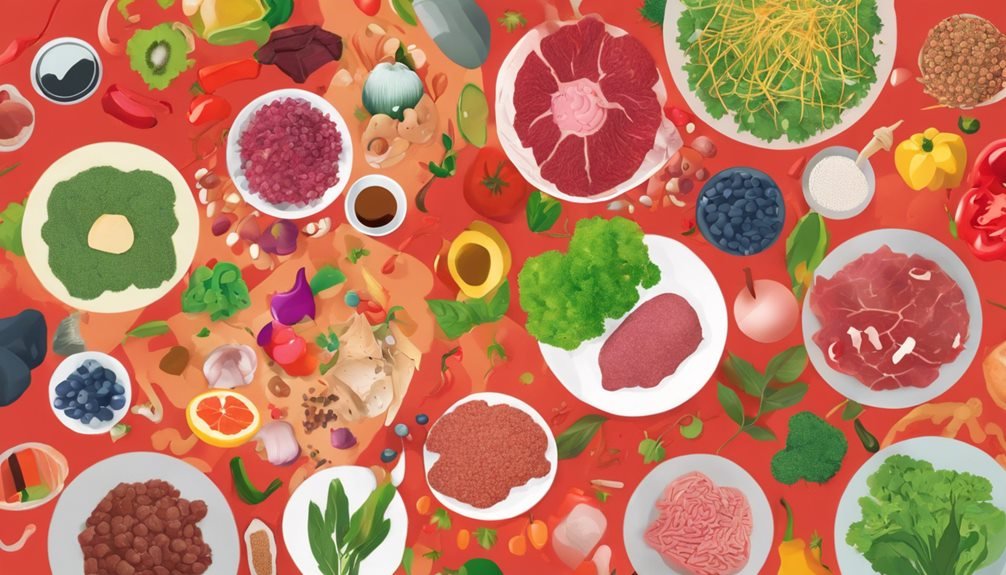
To understand the impact of red meat on cancer promotion, it's vital to recognize the existing body of scientific research that links the consumption of red meat to an increased risk of developing certain types of cancer. Red meat, especially when processed, contains carcinogens that can contribute to the development of cancer. It's essential to consider alternative protein sources and consume red meat in moderation to reduce the risk of cancer. Here are some key points to consider:
- Processed meats like bacon, sausages, and hot dogs have been classified as carcinogenic to humans by the International Agency for Research on Cancer.
- Red meat, when cooked at high temperatures, can form harmful compounds that have been linked to cancer development.
- Opt for lean cuts of red meat and balance your diet with a variety of protein sources such as fish, poultry, legumes, and nuts to lower the risk of cancer associated with red meat consumption.
GMOs Cause Cancer
While there is ongoing debate and concern surrounding the safety and impact of genetically modified organisms (GMOs) on human health, the notion that GMOs cause cancer lacks substantial scientific evidence to support it. Research into GMOs and their potential health effects, including cancer risk, is extensive and ongoing. Multiple reputable organizations, such as the World Health Organization (WHO) and the National Academy of Sciences, have conducted comprehensive reviews that have not found conclusive evidence linking GMO consumption to cancer.
| GMO Research Findings | Cancer Prevention Strategies |
|---|---|
| GMOs are extensively studied with no clear link to cancer | Focus on a balanced diet rich in fruits and vegetables |
| WHO reports no adverse health effects from GMO consumption | Maintain a healthy weight and engage in regular physical activity |
| National Academy of Sciences finds GMOs safe for consumption | Limit processed foods and sugary drinks |
| GMO crops are rigorously tested for safety before approval | Avoid smoking and excessive alcohol consumption |
Frequently Asked Questions
Can I Eat Sugar in Moderation if I Have Cancer?
You can enjoy sugar in moderation while managing cancer. Balance is key; limit high-sugar foods and opt for natural sources like fruits. Monitoring your overall sugar intake is crucial for maintaining a healthy diet. By making mindful choices and focusing on moderation, you can still enjoy a sweet treat without compromising your health goals. Remember, it's about finding a balance that works for you and supports your well-being.
Are There Any Benefits to Following an Alkaline Diet?
When considering an alkaline diet, it's essential to understand its effectiveness and risks. While some believe in its benefits for overall health, there's limited scientific evidence supporting its impact on cancer prevention or treatment. Alkaline water, often a component of this diet, faces controversies as well.
Remember to consult with healthcare professionals before making significant dietary changes to ensure you're prioritizing your health and well-being.
Do Superfoods Alone Have the Power to Cure Cancer?
Superfoods hold significant nutritional value but alone can't cure cancer. While they provide essential nutrients, cancer treatment typically requires a comprehensive approach. Alternative treatments may support traditional methods, but evidence for superfood effectiveness in curing cancer is limited. It's crucial to consult healthcare professionals for a well-rounded treatment plan.
Is a Vegan Diet the Only Solution for Cancer Patients?
Is a vegan diet the only solution for cancer patients? While a vegan diet can offer benefits, it's not the only option for cancer patients. Consider the potential advantages of a keto diet or exploring fasting benefits. Consulting with healthcare providers and nutritionists can help tailor a dietary approach that aligns with your specific needs and preferences. Remember, it's essential to find a balanced diet that supports your overall health and well-being during cancer treatment.
Should I Avoid All Antioxidants During Cancer Treatment?
You don't need to avoid all antioxidants during cancer treatment. There's an antioxidant controversy, but it's essential to maintain nutritional balance. Some antioxidants may interfere with specific treatments, so it's crucial to consult with your healthcare team.
Focus on a well-rounded diet that includes a variety of nutrients to support your overall health during treatment. Your team can help you make informed decisions based on your individual needs.
Conclusion
In conclusion, it is important to debunk the dietary myths surrounding cancer management. Did you know that only around 5-10% of cancers are directly linked to inherited genetic mutations? This highlights the significance of lifestyle factors, including diet, in cancer prevention and treatment. Remember to stick to a balanced diet and consult healthcare professionals for personalized nutrition plans, rather than falling for unproven myths. Your health is too important to be swayed by misinformation.
